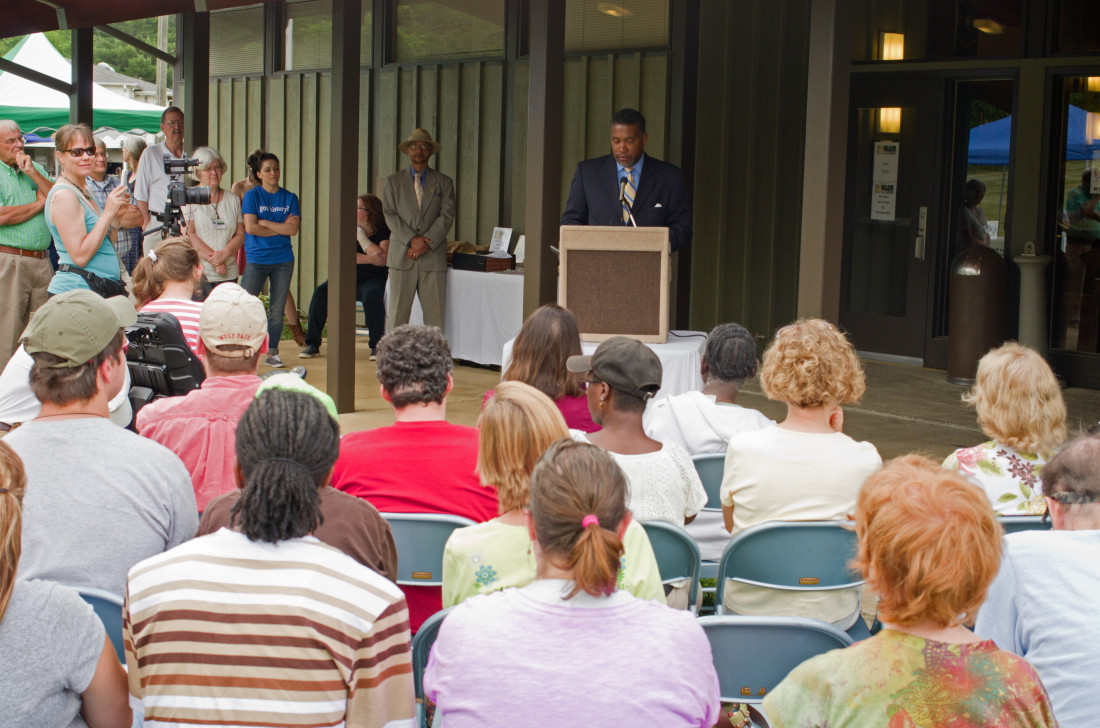Nearly 150 years after the end of the Civil War, one of the era’s most important historical documents was displayed in Western North Carolina for the first time ever.
Ratified in 1865, the 13th Amendment to the U.S. Constitution ended legal slavery. And in recognition of Juneteenth — or June 19, the date many observe to mark when the last of the enslaved learned they were free — the document was released from the climate-controlled state archives in Raleigh.
It was exhibited locally for one day only, June 12, at the Vance Birthplace in Weaverville, and was accompanied by an array of speakers, performers and other historical presentations. One of the goals was “to bring history to life,” said keynote speaker Darin Waters, a history professor at UNC Asheville. “Next year will be the 150th anniversary of the ending of the Civil War and emancipation. And it’s good for us to reflect on that.”
The Weaverville farmstead that birthed former governor Zebulon Baird Vance served as an ideal setting for such reflection, said Earl Ijames, a curator for the North Carolina Museum of History who put the exhibit together. The Vance family was among the largest slaveholders in Buncombe County in the early years of the 19th century. Records for 1811 alone reveal that 18 enslaved Africans labored on their land serving as livestock herdsmen, agricultural laborers, domestic servants, mill operators, artisans and craftsmen. Many of their original quarters remain on the property as well as the family’s main cabin.
Photos from the 13th Amendment exhibit at Vance Birthplace by Cindy Kunst
Steven Nash, history professor at East Tennessee State University, said it’s “a popular misconception” that slavery didn’t exist in the Appalachian mountains. “Slavery was very significant in Western North Carolina. … In just about every aspect of life in Western North Carolina you found the presence of slavery,” he said in a lecture at the event. Although the region lacked the large plantations that are associated with slavery in pop culture, thousands of slaves toiled in Buncombe County as cooks, farmers, tour guides, road builders and more, he said.
Warren Wilson College Professor Jeff Keith also spoke of the important role slaves played in building the local area’s foundation. Keith is part of a group that’s working to renovate the South Asheville Cemetery in Kenilworth, which is the area’s largest known slave burial ground. Corresponding to the June 12 event, Keith and his students launched a new website, providing historical information about the cemetery as well as the first digital map of its nearly 2,000 graves, most of which are unmarked.
“We want to keep the memory alive. We want to cultivate memories,” Keith said.
North Carolina’s copy of the 13th Amendment will travel to only a handful of other locations before going back into the vaults indefinitely. Of the 11 Confederate states that received the document for ratification in 1865, North Carolina is one of only three that have retained its original copy, said Ijames. As the document makes the rounds across the state for the first time ever, Ijames said he hopes it will spark “honest discussions about real reconciliation. … This is the type of reparation we need to have: a change of heart.”
On June 14, another Juneteenth celebration happened at the Hillcrest public housing complex in Asheville. The fourth annual event honoring the end of slavery also included a range of exhibits and performers. “This is an important event for the African-American community,” said Howard Nemon, one of the organizers with the Women’s Wellbeing and Development Foundation. “It gives people a chance in Asheville to come together. … It’s a community-building process. It’s a great social event.”
Even as the years go by since the 13th Amendment was passed, Waters said it’s just as important now as ever to think about the end of slavery and its ongoing implications for society. “We take things for granted and I think having opportunities, events like this, make us sit back and reflect upon the seriousness of that moment and what that moment created, the opportunities it created,” he said. “And hopefully it generates greater interest for us to take advantage of the opportunities that we do have in front of us today.”




That was interesting. I just hope i would benefit a lot of people.